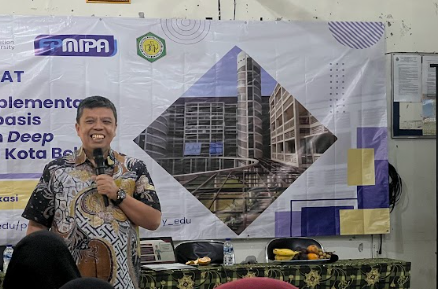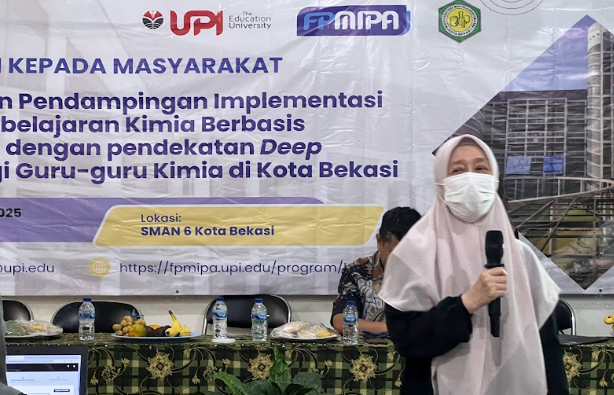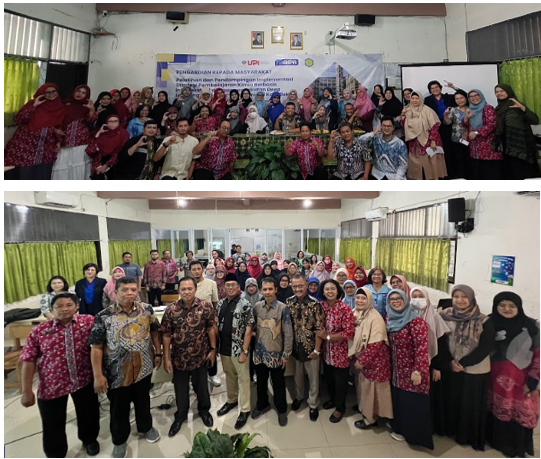
Bekasi, August 1, 2025 - The Chemistry Education Study Program of the Faculty of Mathematics and Natural Sciences (FPMIPA) of UPI, in collaboration with the Bekasi City Chemistry Subject Teachers’ Conference (MGMP), conducted a community service activity entitled “Training and Mentoring for the Implementation of Intertextual Learning Strategies with a Deep Learning Approach for Chemistry Teachers in Bekasi City.” This activity took place at SMAN 6 Bekasi and was attended by approximately 52 chemistry teachers from public and private high schools throughout Bekasi City. The event began with remarks from the Principal of SMAN 6 Bekasi, Mr. Dedi Suryadi, and was attended by the Chair of the Bekasi City Chemistry MGMP, the Chair of the MGMP Studio, and high school supervisors within the Bekasi City Education Office. The presence of these stakeholders demonstrated strong support for improving chemistry teacher competency through activities that are applicable and relevant to curriculum developments.

Training participants: Public and Private High School Teachers in Bekasi City
In this activity, teachers received training and mentoring from three lecturers from the Chemistry Education Study Program at the Faculty of Mathematics and Natural Sciences, University of Indonesia (UPI), who served as key speakers: Prof. Dr. Wiji, M.Si., Dr. Sri Mulyani, M.Si., and Tuszie Widhiyanti, Ph.D. The training was divided into three topics: an introduction to intertextual learning strategies using a deep learning approach, a review of Lesson Plans (RPPs), and a discussion related to the student Academic Ability Test (TKA).

Prof. Dr. Wiji, M.Si., delivered material on Intertextual Learning Implementation Strategies Based on Deep Learning.
In the first session, Prof. Dr. Wiji, M.Si., explained that in teaching, it is crucial for teachers to understand chemistry content. This begins with understanding the characteristics of chemistry itself, which is considered abstract and complex. Teachers must begin by understanding how to convey it to students. Chemistry should not be perceived as difficult; one of the reasons is the teacher’s inability to convey chemistry material correctly. Chemistry is presented at three levels of representation, ensuring students understand the material holistically. It begins with a macroscopic level, relevant to everyday life, followed by molecular (submicroscopic) explanations, and then the use of symbols at the symbolic level. Deep learning, which emphasizes the learning process and the depth of student understanding, is not new in education. Teachers must begin to shift their perspective; they should not be burdened with new labels but rather focus on the true essence of learning. The topic of deep learning has become a hot topic among teachers due to upcoming curriculum changes.

Dr. Sri Mulyani, M.Si., Delivering a Discussion on Lesson Plan Analysis
The second session was moderated by Dr. Sri Mulyani, M.Si., who invited participants to critically analyze one of the lesson plans frequently used as a reference by teachers in Bekasi City. According to Dr. Sri, the focus is not solely on format, but rather on the substance of the material and how chemical concepts can be conveyed through a conceptual approach based on laboratory experiences. She provided an example by discussing colligative properties. She explained how this material is presented to students so that they can construct concepts appropriately. Students’ hands-on experience in the laboratory can help develop their reasoning skills related to phenomena, thus connecting them to concepts. Essentially, students develop the correct thought process to understand chemical concepts, not because the teacher imposes existing theories.

Tuszie Widhiyanti, Ph.D., Presenting Discussion Material on the Academic Ability Test
The final session, led by Tuszie Widhiyanti, Ph.D., focused on the Student Academic Ability Test, a key focus in today’s secondary education world. She explained the function of the Student Academic Ability Test (TKA) for students and the characteristics of the questions used. The TKA is a key focus because of its role in measuring higher-order thinking skills and students’ academic readiness to continue to the next level of education. In her presentation, Tuszie explained that the TKA is not just a regular exam, but rather a measurement tool designed to assess analytical skills, reasoning, and comprehensive conceptual mastery. Participants were very enthusiastic about this session, considering its relevance to schools’ needs in preparing students for university entrance exams and national assessments. The discussion was lively, with teachers sharing the challenges they face in developing questions that comprehensively represent students’ competencies.

The three speakers posed for a photo with the committee and participating teachers.
The event concluded with a group photo and a friendly gathering. The teachers expressed their appreciation for the event and hoped that similar training could be held regularly, both offline and online, to continuously update their pedagogical knowledge and skills. (amca)


